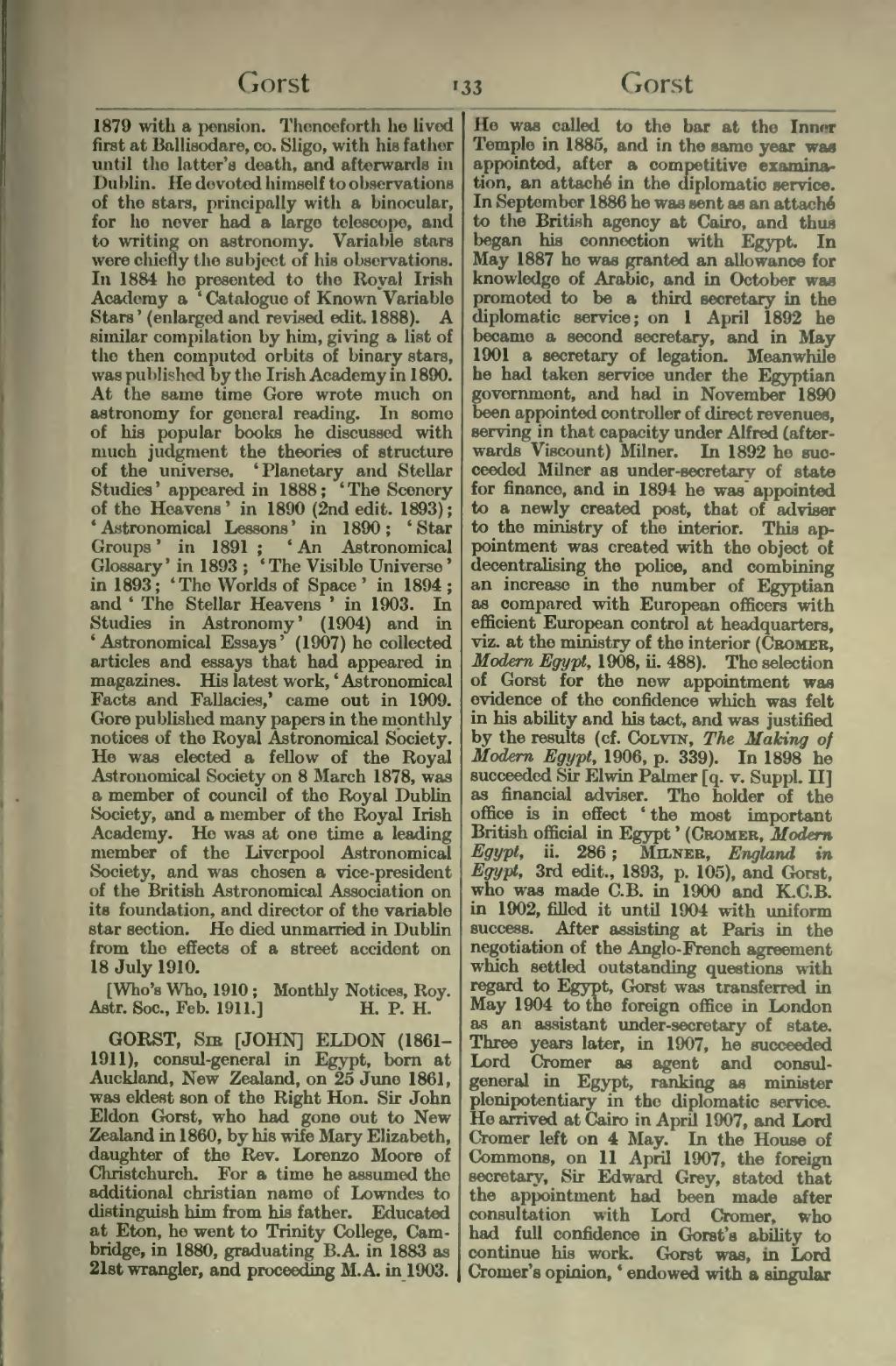1879 with a pension. Thenceforth he lived first at Ballisodare, co. Sligo, with his father until the latter's death, and afterwards in Dublin. He devoted himself to observations of the stars, principally with a binocular, for he never had a large telescope, and to writing on astronomy. Variable stars were chiefly the subject of his observations. In 1884 he presented to the Royal Irish Academy a 'Catalogue of Known Variable Stars' (enlarged and revised edit. 1888). A similar compilation by him, giving a list of the then computed orbits of binary stars, was published by the Irish Academy in 1890. At the same time Gore wrote much on astronomy for general reading. In some of his popular books he discussed with much judgment the theories of structure of the universe. 'Planetary and Stellar Studies' appeared in 1888; 'The Scenery of the Heavens' in 1890 {2nd edit. 1893); 'Astronomical Lessons' in 1890; 'Star Groups' in 1891; 'An Astronomical Glossary' in 1893; 'The Visible Universe' in 1893; 'The Worlds of Space' in 1894; and 'The Stellar Heavens' in 1903. In Studies in Astronomy' (1904) and in 'Astronomical Essays' (1907) he collected articles and essays that had appeared in magazines. His latest work, 'Astronomical Facts and Fallacies,' came out in 1909. Gore published many papers in the monthly notices of the Royal Astronomical Society. He was elected a fellow of the Royal Astronomical Society on 8 March 1878, was a member of council of the Royal Dublin Society, and a member of the Royal Irish Academy. He was at one time a leading member of the Liverpool Astronomical Society, and was chosen a vice-president of the British Astronomical Association on its foundation, and director of the variable star section. He died unmarried in Dublin from the effects of a street accident on 18 July 1910.
[Who's Who, 1910; Monthly Notices, Roy. Astr. Soc, Feb. 1911.]
GORST, Sir [JOHN] ELDON (1861–1911), consul-general in Egypt, born at Auckland, New Zealand, on 25 June 1861, was eldest son of the Right Hon. Sir John Eldon Gorst, who had gone out to New Zealand in 1860, by his wife Mary Elizabeth, daughter of the Rev. Lorenzo Moore of Christchurch. For a time he assumed the additional christian name of Lowndes to distinguish him from his father. Educated at Eton, he went to Trinity College, Cambridge, in 1880, graduating B.A. in 1883 as 21st wrangler, and proceeding M.A. in 1903. He was called to the bar at the Inner Temple in 1885, and in the same year was appointed, after a competitive examination, an attaché in the diplomatic service. In September 1886 he was sent as an attaché to the British agency at Cairo, and thus began his connection with Egypt. In May 1887 he was granted an allowance for knowledge of Arabic, and in October was promoted to be a third secretary in the diplomatic service; on 1 April 1892 he became a second secretary, and in May 1901 a secretary of legation. Meanwhile he had taken service under the Egyptian government, and had in November 1890 been appointed controller of direct revenues, serving in that capacity under Alfred (afterwards Viscount) Milner. In 1892 he succeeded Milner as under-secretary of state for finance, and in 1894 he was appointed to a newly created post, that of adviser to the ministry of the interior. This appointment was created with the object of decentralising the police, and combining an increase in the number of Egyptian as compared with European officers with efficient European control at headquarters, viz. at the ministry of the interior (Cromer, Modern Egypt, 1908, ii. 488). The selection of Gorst for the new appointment was evidence of the confidence which was felt in his ability and his tact, and was justified by the results (cf. Colvin, The Making of Modern Egypt, 1906, p. 339). In 1898 he succeeded Sir Elwin Palmer [q. v. Suppl. II] as financial adviser. The holder of the office is in effect 'the most important British official in Egypt' (Cromer, Modern Egypt, ii. 286; Milner, England in Egypt, 3rd edit., 1893, p. 105), and Gorst, who was made C.B. in 1900 and K.C.B. in 1902, filled it until 1904 with uniform success. After assisting at Paris in the negotiation of the Anglo-French agreement which settled outstanding questions with regard to Egypt, Gorst was transferred in May 1904 to the foreign office in London as an assistant under-secretary of state. Three years later, in 1907, he succeeded Lord Cromer as agent and consul-general in Egypt, ranking as minister plenipotentiary in the diplomatic service. He arrived at Cairo in April 1907, and Lord Cromer left on 4 May. In the House of Commons, on 11 April 1907, the foreign secretary, Sir Edward Grey, stated that the appointment had been made after consultation with Lord Cromer, who had full confidence in Gorst's ability to continue his work. Gorst was, in Lord Cromer's opinion, 'endowed with a singular
